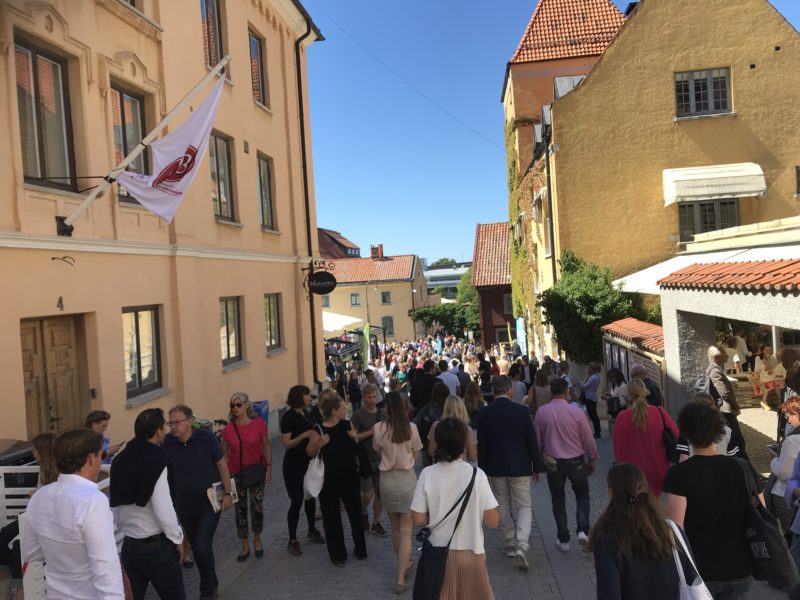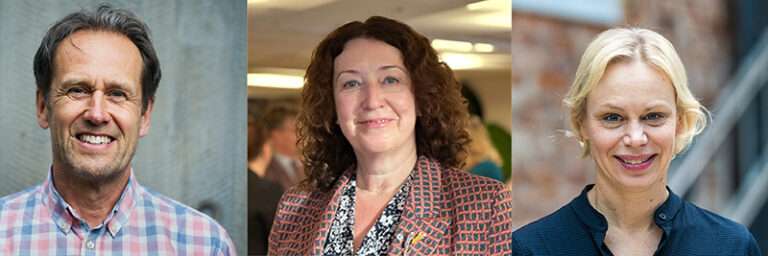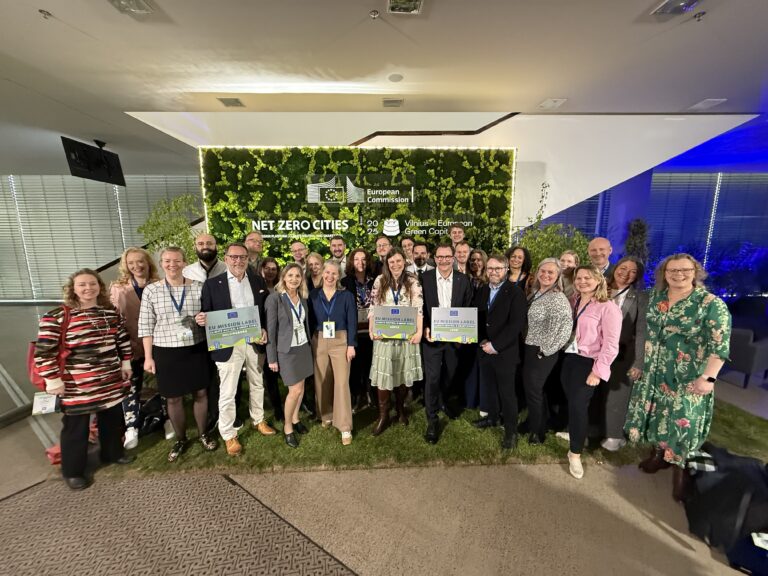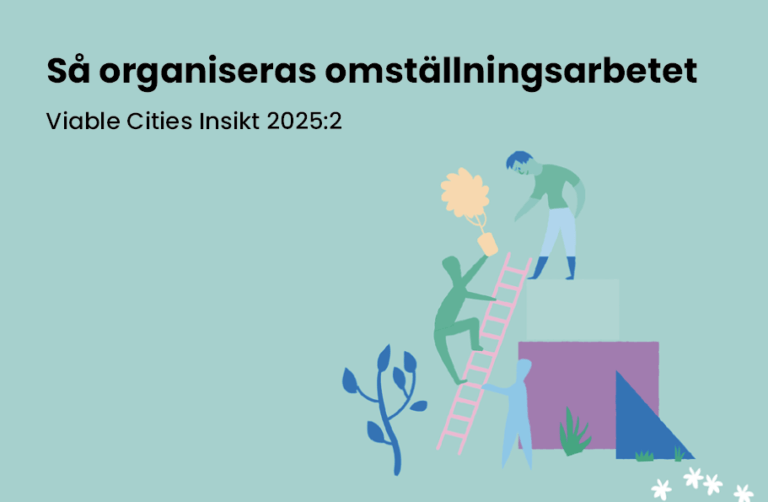The 2018 Almedalen Week in Visby attracted over 45,000 unique visitors and over 4,300 seminars and other events took place during the week. Of the week's events, 55 were explicitly about sustainable cities and 611 were about digitalization.
- An intense and inspiring week where Viable Cities issues were in focus in many contexts," Olga Kordas summarizes.
Present during the Almedalen week from Viable Cities were program manager Olga Kordas, communication strategist Åsa Minoz and Chairman Allan Larsson. We also had the opportunity to meet and socialize with a large number of Viable Cities members, but also with participants in projects that have received funding from Viable Cities.
On Monday 2 July, Viable Cities arranged a seminar focusing on how growing Swedish cities can take the lead in using digitalization for climate neutral cities. The seminar, which took place at the Sustainability Arena at Teaterskeppet, was very well attended and participants crowded the venue. After an introduction to the Viable Cities program by program manager Olga Kordas, Prorector Mikael Östling from KTH commented that it is positive to coordinate the Viable Cities program. The program is well in line with KTH's strategy to contribute to a sustainable society through research and education, respond to societal challenges through cross-border collaboration and drive internationalization in research and education, he says. "We see our researchers, teachers and students as the engines of the transition to a sustainable future," he said.
Viable Cities Chairman Allan Larsson then described the background to the mission "100 climate-neutral cities in Europe by 2030" that framed the seminar. This has its origin in a discussion within the EU on the future direction of research and innovation initiatives, something that Allan Larsson, together with Olga Kordas and Mikael Anneroth from the Viable Cities board, gained insight into during a delegation trip to the European Commission and the European Parliament last spring. Cities are given a more prominent role in the EU's research and innovation initiatives and from a focus on societal challenges, the work is shifting towards so-called missions that will be more concrete and action-oriented. One of those being discussed is "100 climate-neutral cities in Europe by 2030". Viable Cities was met with much curiosity and enthusiasm in Brussels, where Kurt Vandenberghe, who is responsible for FP9 in DG Research, said that "It is not you who should come to us, it is we who should come to you to learn".
Participants then heard how Viable Cities members Umeå, Gothenburg and Stockholm are working to become climate neutral and how they are using digitalization to accelerate this development. Ann-Sofie Hermansson, Member of the City Council Chairman of the City of Gothenburg, emphasized that the goal of a fossil-free Gothenburg by 2030 appears to be increasingly within reach and highlighted a number of innovation initiatives in the areas of mobility, energy and consumption that the city is working on and where digitalization is important. Among other things, she mentioned Gothenburg's participation in several initiatives within Viable Cities, including the test bed for sharing services in Sharing Cities Sweden, together with Umeå, Stockholm and Malmö, and an innovation project(MerIT) where the city and its employees will test simple ways to travel in a more environmentally friendly way in the service. Hans Lindberg, Member of the Municipal Executive Board Chairman in Umeå Municipality, points out that Umeå works hard on partnerships - locally and regionally, of course, but also nationally and internationally. This is necessary, he says, for Umeå and northern Sweden to be a national and international leader in the transition to climate-neutral cities. He also pointed out that Swedish cities need to become better at challenging themselves internationally, also to learn from others who are far ahead. He pointed out that Umeå, Stockholm and Gothenburg are currently among the EU's Smart Cities Lighthouses and that there should be many more Swedish cities. Jan Valeskog, Mayor of Stockholm, highlighted the city's goal of being both the world's smartest city and fossil fuel-free by 2040. He pointed to a selection of innovation efforts related to digitalization that can accelerate this transition, including smart lighting, intelligent traffic signals, smart locks, visualization of the city's resource use and citizen engagement through a "Citizen Communication Platform".
Then three future scouts - Darja Isaksson, digitalization strategist and incoming CEO of Vinnova; Catarina Nauclér, R&D Manager, Fortum and Magnus Leonhardt, Head of Strategy and Innovation, Telia Sweden - gave their reflections on the cities' presentations and their predictions about the future. They consistently highlighted that technology is not the challenge when it comes to using digitalization to accelerate the transition to climate- and resource-efficient cities. Rather, it is human behavior and norms we need to change. They also emphasized the importance of a well-developed digital infrastructure and well-functioning interaction between public activities, academia and research and business. They also highlighted the importance of starting from people's needs and driving forces in order to develop and scale up digital solutions. Darja Isaksson made an acclaimed prediction of the future in the form of a scenario in 2030 when her son Baltazar will be 20 years old. Darja Isaksson's foresight can be read in full here.
To conclude, moderator Åsa Minoz asked which Swedish city will be the first to become climate neutral. The audience gave a variety of answers. Including Uppsala 2050 (a disappointing scenario) and Almedalen 2030. Interesting to think of such an extensive and visible event aiming to be climate neutral by 2030.
On Thursday, Viable Cities, together with its partners, held an expert lunch with a review and reflection on the key issues during the Almedalen Week in the field of sustainable cities. See separate article summarizing this event. An important conclusion from this expert lunch was a common desire for many, including Viable Cities, to use Almedalen Week as a living lab for the development of sustainable cities.
During the week, a wide range of events with strong relevance to Viable Cities took place. Among those we had the opportunity to participate in or cover were, for example:
-
Are cities smart enough for AI?
This seminar included Professor Magnus Boman, who developed a SWOT for Viable Cities in the field of AI. An important starting point for the seminar was the report Life with AI. -
Beyond the car: Low-carbon urban development from utopia to practice
A seminar based on the Mo-Bo project that has just received funding from the first Viable Cities call. -
Citizen-driven innovations - what are they and how do they contribute to sustainable cities?
A fantastically interesting topic that unfortunately received limited attention due to the ongoing World Cup football match, but which we from Viable Cities welcome. -
Testbeds - tools to meet the challenges of cities while creating international excellence?
An urgent area with a strong connection to the call that is currently open within Viable Cities with October 15 as the deadline for applications. -
Can industries, cities and people halving climate emissions become a global idea? (Carbon Law)
The seminar was based on the Global Carbon Law recently presented by researchers as a way to accelerate the transition by halving climate emissions every ten years. -
When will Sweden be the best in the world at digitalization?
In connection with this seminar, the recently published OECD report with a review of Sweden's prerequisites for digitalization was presented and discussed. During the seminar, Minister for Civil Affairs Ardalan Shekarabi also announced the appointment of Anna Eriksson as Director General of the new digitalization authority DIGG.
Many thanks to everyone we had the opportunity to exchange with during Almedalen Week 2018!




